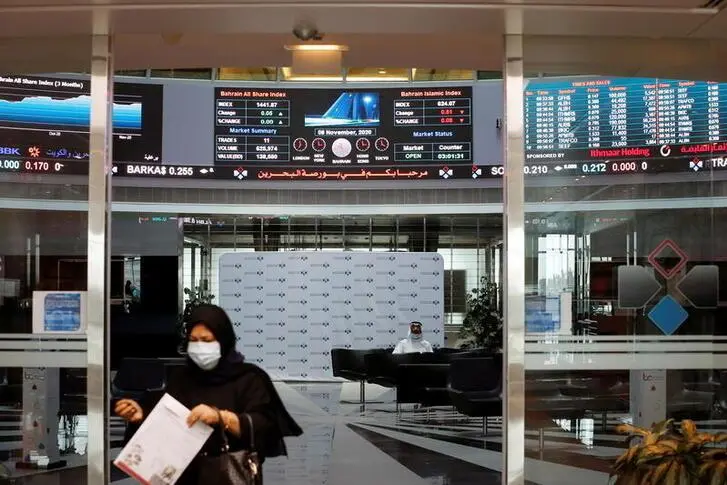PHOTO
MANAMA: After closing 2019 as one of the best-performing markets in the GCC, the Bahrain Bourse (BHB) declined by 7.5 per cent in 2020 and closed at 1489.78 points.
Kamco Invest’s GCC Equity Markets 2020 report shows sectoral performance was mixed in Bahrain with the investment sector (-16.8pc), hotels and tourism (-16.2pc) and commercial banks (-14.8pc) leading the losers for the year.
Services (+25.5pc) and industrials (+22.1pc) were the best performing indices on the exchange.
Trading activity was mixed, as volumes marginally improved by 0.5pc year-on-year (YoY) to 1163.6 million shares in 2020, whereas value traded declined by 28.1pc YoY to BD205.9m.
AUB was the most actively traded stock of 2020 with BD51.46m worth of its shares traded on BHB.
Batelco and GFH followed with BD31m and BD30.7m worth of shares traded.
In terms of volumes traded, GFH was the most active stock as 507.4m shares were traded, followed by AUB and Al Salam Bank Bahrain with 181.4m and 140.8m shares respectively.
Batelco was the top-performing stock in the index for the year as its share price was up by 55pc YoY in 2020.
Ithmaar Holding and Alba followed with gains of 40pc and 22.7pc respectively YoY.
On the other hand, shares of Nass Corp witnessed the most declines, losing 49.4pc YoY in 2020.
Bahrain Commercial Facilities Company and Bank ABC followed with declines of 37pc and 36.2pc respectively for the year.
Analysis by the Kuwait-based financial powerhouse finds almost all the GCC markets remained in the red for the bulk of the year especially led by the impact of Covid-19 and the decline in crude oil prices on markets since March-2020.
However, by year-end, two out of seven exchanges closed in the green led by gradual gains post the decline in Q1-2020.
GCC equity markets under-performed their global peers and witnessed mixed performances across individual stock exchanges in the region.
The aggregate MSCI GCC index reported a yearly decline for the first time in five years and was affected by twin dilemmas during the year.
Demand
On one hand, governments had to impose Covid-19 restrictions that resulted in one of the most severe impacts on the economic front with an expected 2.7pc decline in GDP rates for the GCC region, as per the IMF.
On the other hand, the decline in demand for crude oil, the biggest revenue source for the GCC governments, resulted in a historic slide in prices to reach a three-decade low at its lowest point in the year.
Volatility in the GCC equity market was the highest in four years with 49 days when the markets moved more than 1pc during the year as compared to 37 days in 2019.
Almost all the markets in the GCC were in the red in terms of YTD returns for the bulk of the year and recovered only during Q4-2020.
The decline in oil revenues resulted in fiscal pressure on GCC governments and the additional spending associated with Covid-19 resulted in record deficits.
Debt issuance in the region was at a record high as well.
Also, the culmination of fiscal pressure and over-dependence on oil resulted in downgrades of four out of six sovereigns in the region.
In terms of sector performance, more sectors in the GCC witnessed gain during the year. However, a decline in large-cap sectors more than offset these gains.
Among the gainers, the consumer durables and apparel index reported the highest yearly returns of 86.1pc benefiting from the sustained demand despite the lockdowns due to the inelastic and non-cyclical nature of the stocks in the index.
A similar impact was seen on the food and drug retail sector that posted the second biggest returns during the year at 56.2pc after being the best performer in 2019.
Healthcare-related indices also recorded gains of more than 40pc, whereas the food and beverage index was up 28.8pc.
On the other hand, the banking index was the biggest loser during the year sliding by 5.5pc followed by the real estate index which logged a 2.4pc decline.
Energy and diversified financials sectors reported declines of 1.9pc each.
Trading activity on the GCC exchanges was higher during 2020 and was largely broad-based, barring Oman and Bahrain.
Total value traded in the GCC last year more than doubled to $659.8 billion from $309.9bn in 2019.
avinash@gdn.com.bh
© Copyright 2020 www.gdnonline.com
Copyright 2021 Al Hilal Publishing and Marketing Group Provided by SyndiGate Media Inc. (Syndigate.info).





















